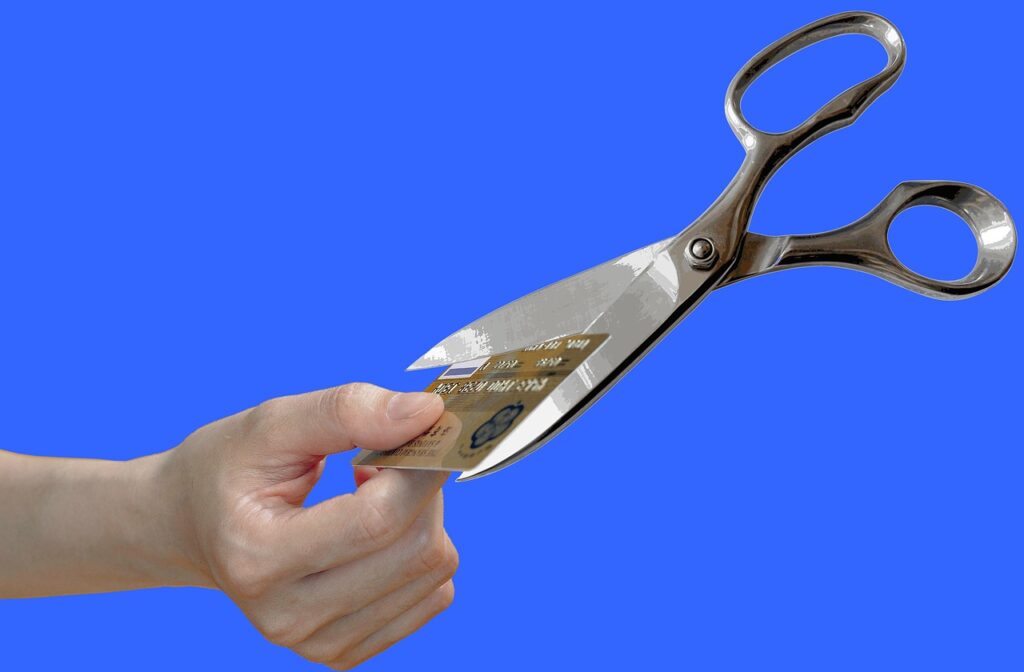
Intro
Dealing with debt can be an overwhelming and stressful experience, especially when you have a low income. The constant worry of how to make ends meet and pay off your debts can take a toll on your mental and emotional well-being. However, there is hope. With the right strategies and determination, it is possible to get out of debt even with a low income. In this blog post, we will share 7 proven ways to help you get out of debt and achieve financial freedom. So, if you’re ready to take control of your finances and improve your financial situation, keep reading!

1) Understanding Your Financial Situation: The First Step towards Freedom
Understanding your financial situation is the first step towards achieving freedom from debt. It’s essential to have a clear understanding of where you currently stand financially before you can make a plan to get out of debt. This step may seem overwhelming, but it is crucial in order to create an effective strategy.
To start, gather all your financial information, such as bank statements, credit card statements, loan documents, and any other relevant documents. Take the time to analyze your income and expenses. Calculate your total income, including any side hustles or additional sources of income you may have. Next, subtract all your expenses, including essential expenses like rent or mortgage payments, utilities, groceries, transportation costs, and any other fixed expenses. Once you have a clear picture of your income and expenses, you can determine how much money you have left over each month to put towards paying off your debts.
If you find that your expenses exceed your income, it’s time to evaluate your spending habits and find areas where you can cut back. Look for unnecessary expenses that can be eliminated or reduced. This may mean cutting back on eating out, entertainment expenses, or non-essential subscriptions. It’s important to be realistic and make adjustments that are manageable for your lifestyle. Small changes can add up and make a significant impact on your financial situation.
If increasing your income is necessary to make ends meet, consider exploring opportunities to generate additional income. This could mean taking on a part-time job, freelancing, or starting a side hustle. Think about your skills, interests, and available time, and explore opportunities that align with those factors. Working longer hours may not be ideal, but it can help improve your financial situation and get you closer to your goal of becoming debt-free.
Understanding your financial situation may be challenging, but it is an essential first step on your journey towards financial freedom. By analyzing your income, expenses, and finding ways to increase income or cut back on expenses, you can create a solid foundation for your debt repayment plan. Remember, this step is about gaining clarity and taking control of your financial situation. Stay motivated and committed, knowing that you are taking the first step towards a brighter and debt-free future.

2) Cutting Expenses and Saving Smartly: Key to Surviving on a Low Income
When you have a low income, cutting expenses and saving money becomes essential for not only surviving but also getting out of debt. It may seem challenging, but with a little creativity and determination, you can find ways to stretch your dollars and make the most of what you have.
One of the most effective ways to cut expenses is to create a budget and stick to it. Take a close look at your expenses and identify areas where you can make adjustments. For example, instead of eating out, consider cooking at home and bringing your lunch to work. Not only will this save you money, but it can also be a healthier option. Look for deals and discounts when shopping for groceries or household items, and consider buying in bulk to save even more.
Another way to cut expenses is to evaluate your monthly bills and see if there are any opportunities to negotiate or lower them. Contact your service providers, such as cable or internet companies, and ask about any promotions or discounts that may be available. Additionally, consider cutting back on non-essential subscriptions or services that you can live without.
Finding ways to save on transportation costs can also make a significant difference in your budget. Consider carpooling, taking public transportation, or even biking or walking if possible. These alternatives not only save money on gas and parking but can also improve your physical health and reduce your carbon footprint.
In order to make the most of your limited income, it may be necessary to work longer hours. Taking on additional shifts or freelance projects can provide that extra boost to your income and help you reach your financial goals faster. While it may be challenging and tiring, remember that it is only temporary and that the sacrifice will pay off in the long run.
Lastly, don’t underestimate the power of small savings. Cutting back on unnecessary expenses like eating out, entertainment, or impulse purchases can add up over time. Instead of buying a cup of coffee every day, try making it at home and investing in a reusable coffee mug. Consider shopping at thrift stores or online marketplaces for clothing or household items. Every penny saved is a step closer to financial freedom.
Remember, cutting expenses and saving smartly is crucial when you have a low income. By creating a budget, making adjustments to your lifestyle, and finding ways to save, you can make the most of your money and achieve your goal of getting out of debt.

3) Clearing Your Debts One by One: An Effective Strategy for Low Earners
Clearing your debts can feel like an overwhelming task, especially when you have a low income. However, by adopting an effective strategy, you can tackle your debts one by one and make steady progress towards becoming debt-free.
The first step in clearing your debts is to organize them. Make a list of all your debts, including the amount owed, interest rates, and minimum monthly payments. This will give you a clear picture of your financial obligations and help you prioritize which debts to tackle first.
Once you have your debts organized, consider using either the debt snowball or debt avalanche method. The debt snowball method involves paying off your smallest debts first while making minimum payments on larger debts. This approach provides a sense of accomplishment as you quickly eliminate smaller debts, motivating you to keep going. On the other hand, the debt avalanche method focuses on paying off debts with the highest interest rates first. This approach can save you more money in the long run by minimizing the amount of interest you pay.
Regardless of the method you choose, it’s important to allocate as much money as possible towards your chosen debt. Look for ways to increase your income or cut expenses in order to free up extra money to put towards debt repayment. Consider taking on a side hustle, selling unwanted items, or cutting back on discretionary spending.
As you begin paying off your debts, celebrate your milestones along the way. Every time you pay off a debt, take a moment to acknowledge your progress and reward yourself, even if it’s something small. This positive reinforcement will help keep you motivated and committed to your debt repayment journey.
Remember, clearing your debts one by one takes time and dedication. Stay focused on your goal and don’t be discouraged by setbacks. With persistence and a solid plan, you can achieve financial freedom and create a brighter future for yourself, even on a low income.

4) Generating Additional Income: Smart Side Hustles for Extra Cash
When you have a low income and are trying to get out of debt, finding ways to generate additional income can be a game-changer. Taking on side hustles is a great way to bring in extra cash and speed up your debt repayment journey. Here are some smart side hustles that can help you boost your income:
- Freelancing: If you have a skill or talent, consider freelancing in your spare time. Whether it’s writing, graphic design, web development, or social media management, there are plenty of opportunities online. Platforms like Upwork, Fiverr, and Freelancer connect freelancers with clients seeking their services.
- Virtual Assistance: Many small business owners and entrepreneurs need help with administrative tasks. Offer your services as a virtual assistant and provide support with tasks like scheduling, email management, research, or data entry. Websites like Virtual Assistant Finder and Fancy Hands can connect you with clients in need of virtual assistance.
- Renting out a Room: If you have an extra room in your home, consider renting it out on platforms like Airbnb or Homestay. This can be a great way to earn some extra cash and make use of unused space.
- Dog Walking/Pet Sitting: If you love animals, consider offering dog walking or pet sitting services. Many pet owners are in need of someone to care for their furry friends while they are away. Websites like Rover and Wag can help you find clients in your area.
- Tutoring: If you have expertise in a particular subject, offer tutoring services to students in need of extra help. You can offer in-person tutoring or provide virtual tutoring through platforms like Tutor.com or Chegg.
Remember, finding the right side hustle is all about leveraging your skills and interests. Choose something that you enjoy and aligns with your schedule. By generating additional income through smart side hustles, you can increase your cash flow and make significant progress in paying off your debts. So, start exploring these opportunities and take control of your financial future.

5) Prioritizing Lowest Debt First: Why and How?
When it comes to tackling your debts on a low income, prioritizing your lowest debt first is a strategy that can make a big difference in your journey towards financial freedom. But why is it important, and how exactly do you go about doing it?
Prioritizing your lowest debt first is a powerful approach because it provides a psychological boost and keeps you motivated throughout the debt repayment process. By targeting the smallest debt, you can quickly eliminate it, giving you a sense of accomplishment and showing you that progress is possible. This small win can be incredibly motivating, fueling your determination to continue tackling your debts.
Another advantage of prioritizing your lowest debt first is that it allows you to free up additional cash to put towards your remaining debts. Once you’ve paid off the smallest debt, you can take the money you were allocating to that debt and roll it over to the next debt on your list. This snowball effect creates momentum, allowing you to make larger payments towards your remaining debts as you work your way up to the larger ones.
To prioritize your lowest debt first, start by listing all of your debts in order from smallest to largest. Make sure to include the outstanding balance, interest rate, and minimum monthly payment for each debt. Then, focus on making the minimum payments on all of your debts while allocating any extra money you have towards the smallest debt. This can be accomplished by cutting back on expenses or finding additional sources of income.
As you pay off each debt, celebrate your progress and use the money that was previously allocated to that debt to tackle the next one on your list. Keep repeating this process until all of your debts are paid off.
Remember, prioritizing your lowest debt first is not only a practical strategy, but it’s also a way to build momentum and stay motivated. By taking small, achievable steps, you can gradually eliminate your debts and move closer to financial freedom. So start prioritizing your lowest debt today and watch as your debt-free future comes into view.

6) Seeking Professional Help: When and Where?
If you find yourself struggling to manage your debts on a low income, seeking professional help can be a wise decision. While you may feel overwhelmed or hesitant about reaching out for assistance, it’s important to remember that you don’t have to navigate the journey towards debt freedom alone.
One option for seeking professional help is to consult with a credit counseling agency. These organizations are dedicated to providing guidance and support to individuals who are facing financial challenges. They can help you create a personalized debt repayment plan, negotiate with creditors on your behalf, and provide education on financial management. Additionally, credit counseling agencies often offer free or low-cost services, making them accessible to individuals with limited financial resources.
Another professional resource to consider is a financial advisor. These professionals can provide expert advice and assistance in creating a comprehensive financial plan. They can help you evaluate your financial situation, set realistic goals, and develop strategies to achieve them. A financial advisor can also provide guidance on investment opportunities, retirement planning, and other long-term financial considerations.
When seeking professional help, it’s important to choose reputable and trustworthy individuals or organizations. Do your research, read reviews, and ask for recommendations from friends, family, or trusted professionals. Look for certifications or accreditations that indicate the individual or organization has the necessary expertise and qualifications to assist you effectively.
Remember, seeking professional help is not a sign of failure but rather a proactive step towards improving your financial situation. These professionals have the knowledge and experience to guide you through the complexities of debt management and help you develop sustainable strategies for financial success. Don’t hesitate to reach out for assistance and take control of your debt.

7) Cultivating Positive Financial Habits: Your Lifelong Investment
When it comes to getting out of debt on a low income, it’s not just about finding short-term solutions. It’s also about developing positive financial habits that will set you up for long-term success. Cultivating these habits is like making an investment in your future, and it’s something that will benefit you for years to come.
One important habit to cultivate is creating and sticking to a budget. A budget helps you track your income and expenses, ensuring that you’re spending within your means and not accumulating more debt. By setting aside a portion of your income for savings and debt repayment, you’re actively working towards your financial goals.
Another habit to develop is being mindful of your spending. It’s easy to get caught up in the allure of impulse purchases and instant gratification, but these habits can lead to more debt and financial stress. Instead, practice delaying gratification and make thoughtful decisions about your purchases. Ask yourself if the item is a need or a want, and if it aligns with your long-term financial goals.
Consistency is key when it comes to cultivating positive financial habits. Make it a routine to review your budget regularly, track your spending, and reassess your financial goals. This will help you stay on track and make adjustments as needed. Celebrate your progress along the way, no matter how small, and keep reminding yourself of the long-term benefits of your financial habits.
Finally, educate yourself about personal finance. Read books, listen to podcasts, and seek out resources that can expand your knowledge and understanding of financial matters. The more you know, the better equipped you’ll be to make informed decisions about your money and avoid common financial pitfalls.
Cultivating positive financial habits takes time and effort, but the payoff is well worth it. By developing these habits, you’re creating a strong foundation for your financial future. You’ll have the tools and mindset to not only get out of debt but also to build wealth and achieve your long-term financial goals. So start today and make positive financial habits a lifelong investment in your financial well-being.
Click here if you would like to learn more about personal finance.


Pingback: 7 Practical Tips for Sticking to Your Holiday Budget – Esvea Accounting bookkeeping